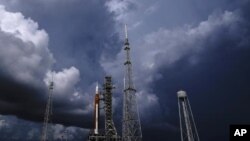"NASA is forgoing a launch opportunity... and preparing for rollback (from the launchpad), while continuing to watch the weather forecast associated with Tropical Storm Ian," it said on Saturday.
The US National Hurricane Center (NHC) said Ian is due to "rapidly intensify" over the weekend as it moves toward Florida, home to the Kennedy Space Center, from which the rocket is set to launch.
Currently south of Jamaica, the storm is expected to approach Florida's west coast "at or near major hurricane strength" early next week, threatening storm surge, flooding and hurricane-force winds across much of the state, the NHC said.
On the launchpad, the giant orange and white Space Launch System (SLS) rocket can withstand wind gusts of up to 137 kilometers (85 miles) per hour. But if it has to be sheltered, the current launch window, which runs until October 4, will be missed.
A decision on whether to roll back the rocket to the Vehicle Assembly Building is due to be taken by the Artemis 1 team on Sunday, "to allow for additional data gathering and analysis," with the operation, if necessary, starting late Sunday or Monday morning, NASA said.
Jim Free, associate administrator for the agency's exploration systems development directorate, said on Twitter that a "step-wise approach" to the decision to roll back preserves "a launch opportunity if conditions improve," indicating a launch date before October 5 was still on the table.
If not, the next launch window will run from October 17 to 31, with one possibility of take-off per day, except from October 24-26 and 28.
The Artemis 1 space mission hopes to test the SLS as well as the unmanned Orion capsule that sits atop it, in preparation for future Moon-bound journeys with humans aboard.
Artemis is named after the twin sister of the Greek god Apollo, after whom the first Moon missions were named.
Unlike the Apollo missions, which sent only white men to the Moon between 1969 and 1972, Artemis missions will see the first person of color and the first woman step foot on the lunar surface.
A successful Artemis 1 mission would come as a huge relief to the US space agency, after years of delays and cost overruns.
But another setback would be a blow to NASA, after two previous launch attempts were scrapped when the rocket experienced technical glitches including a fuel leak.
The cost of the Artemis program is estimated to reach $93 billion by 2025, with its first four missions clocking in at a whopping $4.1 billion each, according to a government audit.
Storm Stops Moonship Launch

NASA has called off the scheduled Tuesday launch of its historic uncrewed mission to the Moon due to a tropical storm that is forecast to strengthen as it approaches Florida.
WASHINGTON —